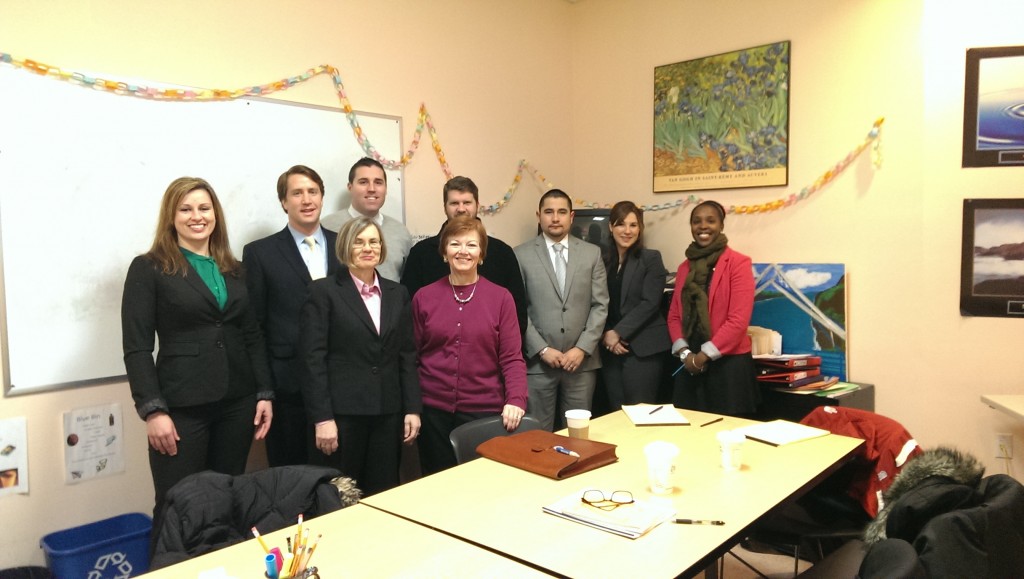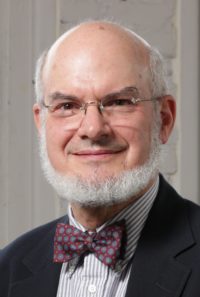Seven years ago, Sue Finegan, a partner at Boston law firm Mintz Levin, approached Kathy McGrath, Senior Corporate Counsel at Liberty Mutual, about a possible partnership. Liberty Mutual was already a client of Mintz Levin’s, but Finegan, who had recently been appointed as the firm’s first Pro Bono Partner, was seeking a new kind of arrangement. She asked McGrath, who was heading the pro bono department at Liberty Mutual, if she and her colleagues would be interested in joining Mintz Levin volunteers at a pro bono legal clinic at the Pine Street Inn.
McGrath accepted, and this joint venture marked the beginning of an ongoing partnership. Twice a year, lawyers from both Mintz Levin and Liberty Mutual come together to staff two of the bi-weekly legal clinics held by the Lawyers Clearinghouse at three area homeless shelters. The volunteers pair off into teams, often with one lawyer from each group, and conduct intakes for clients seeking help with housing, social security, employment, bankruptcy, and more.
In the early stages of their partnership, Liberty Mutual would send a few people to join Mintz at clinics. Today, the clinics are evenly-staffed from both sides. Nearly 150 Mintz and Liberty volunteers have attended the clinic since 2007, providing thousands of hours of legal work valued at over one million dollars.

“The clinic partnership has really blossomed, and it’s something that we know their people look forward to, and our people look forward to,” said Colin Van Dyke, an associate at Mintz, a past member of the firm’s Pro Bono Committee, and its former clinic coordinator.
The Pro Bono Committee of the Massachusetts Supreme Judicial Court (SJC) has long been interested in encouraging and fostering pro bono work by in-house counsel, and the Mintz-Liberty partnership and others like it serve as an excellent way for in-house departments to assist their communities.
In-house volunteers also ease the burden faced when law firms have conflicts that exclude them from taking certain cases. Finegan said this aspect has been immensely helpful.
Sam Kingsbury, a Mintz associate and the current clinic coordinator, explained that Mintz often has conflicts taking cases involving some housing authorities. Because of this, she believes Liberty Mutual lawyers have developed an “unexpected expertise” over the years when it comes to housing matters.
“I consider [Kathy McGrath] to be an expert on public housing issues, so I think that that is probably an interesting complement to the day-to-day legal work they’re doing at the company,” Kingsbury said.
Often, Mintz Levin sends junior and summer associates to the clinics. This provides an added benefit of allowing less experienced lawyers, as well as law students, to work closely with a client of the firm and to gain client experiences they may not have while working on the larger, more complicated cases typical of big firms.
The Mintz-Liberty partnership has yielded a number of successes over the years, and the volunteers often team up to tackle multi-faceted cases. In 2009, a client arrived at the legal clinic seeking help convincing a housing authority that her multiple chemical sensitivity entitled her to an extra room in her apartment (to air out items that would otherwise give her a reaction) and an increased medical allowance to help reduce her rent, which she was paying with her disability income.
Because of Mintz Levin’s conflict with cases involving that housing authority, Liberty Mutual lawyers represented the client before the housing authority, while the Mintz volunteers conducted background research on acquiring these new living accommodations and on regulations governing medically-necessary items.
Ultimately, the client was granted an extra bedroom and an increased medical allowance, which allowed her to afford an apartment where she could live more comfortably. Liberty Mutual continued to represent her for the next three years, by making annual submissions to the housing authority to ensure her accommodations remained. Eventually, the client was able to represent herself.
Beginning an in-house pro bono program may seem daunting, but a number of resources and opportunities exist that can ease the process and serve as a starting point.
“Partnering with a law firm is a terrific way to get started, because you can kind of piggyback on a law firm’s opportunities, talk to the chair of their pro bono committee to see what kind of discrete projects they have and, like Liberty, join in and get your feet wet,” said Finegan.
“It works out collaboratively, and it really eases the administrative burden, so I think it’s a great model for getting more in-house folks involved,” said Kathy McGrath.
Meanwhile, the Clearinghouse’s clinic program, and others like it, require only a short-term, yet meaningful commitment. Based on the success of the Mintz-Liberty partnership, both Nixon Peabody and Greenberg Traurig have teamed up with in-house counsel from MassHousing, WinnDevelopment, and Boston Scientific Corporation to serve the needs of the homeless through the Legal Clinic.
Corporate Pro Bono also offers a variety of documents and consulting services.
Sue Finegan encouraged in-house counsel to reach out to the SJC’s Pro Bono Committee, which she chairs, and explained that she and Kathy McGrath, who also serves on the Committee, would be happy to talk to prospective volunteers and help them find opportunities.
Those already involved in pro bono programs are hard at work paving the way for future partnerships. Colin Van Dyke explained that it is important to make it easy to start, so people with limited time can be involved.
“If you make it easy,” Van Dyke said, “and they get to experience how good it feels to help someone else, or help an organization – whatever flavor the pro bono work is – once they’re bitten by that bug, they’ll come back. They’ll want to keep feeling that feeling, and you’ll have a pro bono lawyer for life.”


